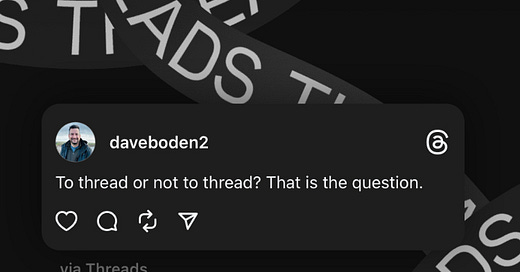So now we are all on another social media platform called Threads.
Apparently, it is better than Twitter, or so says Zuckerberg. Musk thinks otherwise, and wants to get in the ring to prove his point. Yet in just five days, Threads gained over 100 million users and became the fastest-growing app ever.
In today’s Metaverse, we are constantly inundated with an overwhelming amount of content, and now there are even more ways to access it. Social media, news, videos, and now threads bombard us from all directions, consuming our time and filling our minds.
Whether we are "doom scrolling" (the act of obsessively scrolling through negative or emotionally draining content) or intentionally engaging with positive, inspiring, and uplifting material, the content we consume matters. It impacts our mindset and emotions, shapes our perceptions and beliefs, affects our mental well-being, and even influences our identity.
The fact that consuming content can be this impactful on our spiritual formation is not a new concept, it has been a key thread of disciple-making since the early church.
A Thread of CONTENT
Before there were threads to organise our ideas, there was something ancient called ‘catechism’ which was as powerful as any modern algorithm.
cat· e· chism: a summary of Christian beliefs organised as questions and answers
Catechism has played a crucial role in embedding threads of truth. For centuries, it has been a tool used to filter the overwhelming amount of information and knowledge that Christians have to grasp as they embark on their journey with Christ. Catechism employs a question-and-answer style approach that explains the basics of faith in ways that are easily memorised and help learning stick.
An example of this is the well-known Westminster Shorter Catechism, which is structured around 100ish questions, such as:
Q1. What is man's primary purpose?
A: Man's primary purpose is to glorify God and to enjoy him forever.
Historically, this practice was used to systematically teach the building blocks of faith in a conversational style that challenged cultural heresy, formed community, and shaped conversations. It had a drip-drip effect that almost mirrors the habitual scrolling we engage in daily via social media.
There are some really interesting examples of modern digital Catechisms being developed in recent times. For example, Feed by One Hope seeks to counteract the fact that young people continue to decline in their biblical literacy and are disengaging from church at an alarming rate. They are passionate about reviving the practice of catechism among Gen Z using resources that are conversational and relationally driven.
Feed offers a set of core questions and answers to be explored, such as:
WHY AM I ALIVE? I am alive to love God and serve his world by reflecting his goodness in my thoughts, attitudes, and actions.
HOW CAN I KNOW GOD? I can know God through his resurrected Son, Jesus, by the power of the Holy Spirit.
WHO IS GOD? God is the loving Creator who sustains everything. He is eternal and unchanging in his goodness, wisdom, and power.
This may seem very basic, but if you think about it, where we seek our answers from can determine who we become. You can almost hear the alternative answers to these kinds of questions whispered through every post, tweet, and thread across cyberspace.
WHO IS GOD? God is whoever you want them to be.
WHY AM I ALIVE? You are alive to be true to yourself and follow your heart.
HOW DO I FIND MY VALUE? You find your value by being beautiful, rich, or famous.
Every piece of content we consume is either raising questions or answering them. It either points us towards the truth of the good news or away from it.
However, we would be mistaken if we thought that memorisation alone led to transformation.
Princeton theologian Archibald Alexander1 speaks of the role of the Holy Spirit in threading together content with our connection to God when he says,
"Instruction is like firewood in a fireplace. Without the fire—the Spirit of God—firewood will not produce a warming flame. But without fuel, there can be no fire either, and that is what catechetical instruction is."
This poses a significant challenge to us when considering whether the kind of content we consume will either add fuel to our fire or dampen it.
A Thread of CONTENT + COMMUNITY
In a recent podcast, Jessie Cruickshank, the author of Ordinary Discipleship and an expert in brain science, emphasises the importance of placing relationships at the heart of transformation rather than solely relying on increasing our knowledge base.
She states, "I think the idea that we use information to help people transform—it’s not just wrong biblically, but it’s also wrong biologically." She later adds, "We’re created to be transformed through relationship, through mirroring one another, through experiencing the goodness of God."
The secret ingredient to discipleship is not just WHAT you consume but WHO you consume it with.
For content to be effective in the disciple-making process, it must be curated in the context of community, and connected to character change, resulting in greater Christ-like-ness.
Without community, it can remain as information rather than revelation.
We can see the first threads of this emerge when we step back a few thousand years and look at how God shaped the thinking and behaviour of a community in the Old Testament. In the Book of Deuteronomy, God gives this instruction to the Israelites:
"These commandments that I give you today are to be on your hearts. Impress them on your children. Talk about them when you sit at home and when you walk along the road, when you lie down and when you get up. Tie them as symbols on your hands and bind them on your foreheads. Write them on the doorframes of your houses and on your gates." (Deuteronomy 6:6-9)
Encapsulated within these three verses are ten insights from modern brain science and the best of modern education theory. It is as if God knows how humans are designed to learn! To make learning accountable and memorable, we need to follow these Ten Commandments:
Answer the question for people: why bother with this content?
Encourage people to talk about content with others.
Engage in hands-on experiences with the content.
Use memory cues to reinforce learning.
Utilise different learning styles: audio, visual, and kinaesthetic.
Write down what you learn.
Relate content to everyday experiences.
Attach emotions to enhance long-term memory retention.
Teach content to others.
Repeat, repeat, repeat.
These biblical and brain-based approaches help make learning transformative as opposed to just informative. Imagine if we applied them consistently and effectively in our learning communities.
There is a difference between teaching and learning. We have an awful lot of teaching in the church, but who is brave enough to be asking ‘what are we actually learning?’
Ultimately, I can’t comment definitively on whether we should all flock to another social media platform on top of using Twitter, TikTok and Instagram. It is perhaps more interesting to consider how Christians might use these digital tools to embed learning.
It is unfortunate that most churches are still primarily using social media to focus on getting people to attend more meetings or to highlight what we missed out on by not being part of a ‘worship experience’. What if churches saw their online platforms as means to disciple, teach, and train rather than merely promote gatherings?
What if we could harness the power of catechisms and combine them with side-by-side relationships? What if the future of discipleship looked a lot like the past?
http://newcitycatechism.com
Pics: Unsplash








Definitely need to be less "showman of the universe" and be more "guide, philosopher, and friend" to allow connections to be made.
Brilliant! You've just explained what we've been trying to do in the last two years, but unfortunately busyness kills any engagement with what we share. Not even talking about getting to the applying stage! But it does work, and we have seen this on a smaller scale , within our discipling relationship. The result are amazing! Praying it will spread as God changes people's hearts and helps them focus on His will.